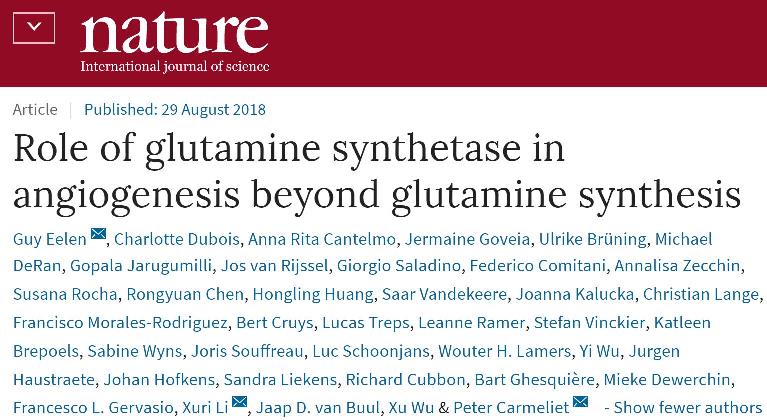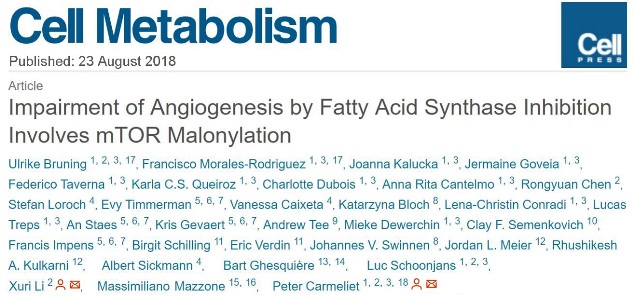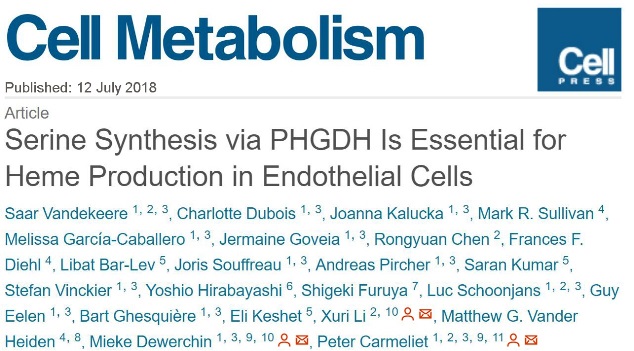Nature, Cell Metabolism Novel discoveries on endothelial cell metabolism in angiogenesis
and Dr. Peter Carmeliet from VIB-KU-Leuven, Belgium
On August 29, 2018, an article titled “Role of glutamine synthetase in angiogenesis beyond glutamine synthesis” was published by the journal of Nature. In this article, Dr. Xuri Li at the Zhongshan Ophthalmic Center (ZOC), Sun Yat-Sen University (SYSU) and Dr. Peter Carmeliet at VIB-KU Leuven in Belgium reveal a previously unrecognized novel role of glutamine synthetase in angiogenesis by promoting vascular endothial cell migration via sustaining RHOJ palmitoylation, membrane localization and activation1.

Glutamine synthetase (GS) is an enzyme that converts glutamate and ammonia to glutamine. Although highly expressed in endothelial cells, it’s role in vessel growth remained unknown. In this work, Dr. Li and Dr. Carmeliet elucidate that deletion of the gene encoding GS impairs vessel sprouting during mouse development, and pharmacological inhibition of GS suppresses angiogenesis in ocular and inflammatory skin diseases by halting endothelial cell migraton. Importantly, while supressing pathological angiogenesis, blocking GS minimally affected normal blood vessels, demonstrating a valuable safty profile for anti-angiogenic therapy. Thus, manipulating GS activity may shed new light into the treatment of neovacular diseases.

Dr. Xuri Li and Dr. Peter Carmeliet at ZOC, SYSU (front, 3 and 4 from left)
Apart from the above discovery, Dr. Xuri Li’s and Dr. Peter Carmeliet’s teams have also jointly published three important articles in the journal of Cell Metabolism recently2-4. These work unveil important roles of different pathways of endothelail cell metabolism in vascular growth and homeostasis. Dr. Li and Dr. Carmeliet show that fatty acid synthase (FASN) promotes angiogenesis by enhancing endothelial cell proliferation through regulating mTOR K1218 malonylation, thus demonstrating a potent anti-angiogenic effect of FASN blockade2. In another work, it is shown for the first time that in quiescent vascular endothelial cells, vasculoprotection is achieved by the upregulation of fatty acid beta-oxidation via redox homeostasis3. Moreover, Dr. Li and Dr. Carmeliet further show that in vasular endothelial cells, serine synthesis via PHGDH is essential for heme production, elustrating an unusual importance of serine synthesis for vascular endothelial cells4.



References
1 Eelen, G. et al. Role of glutamine synthetase in angiogenesis beyond glutamine synthesis.
Nature 561, 63-69, doi:10.1038/s41586-018-0466-7 (2018).
2 Bruning, U. et al. Impairment of Angiogenesis by Fatty Acid Synthase Inhibition Involves mTOR Malonylation.
Cell Metabolism, doi:10.1016/j.cmet.2018.07.019 (2018).
3 Kalucka, J. et al. Quiescent Endothelial Cells Upregulate Fatty Acid beta-Oxidation for Vasculoprotection via Redox Homeostasis.
Cell Metabolism, doi:10.1016/j.cmet.2018.07.016 (2018).
4 Vandekeere, S. et al. Serine Synthesis via PHGDH Is Essential for Heme Production in Endothelial Cells.
Cell Metabolism, doi:10.1016/j.cmet.2018.06.009 (2018).
